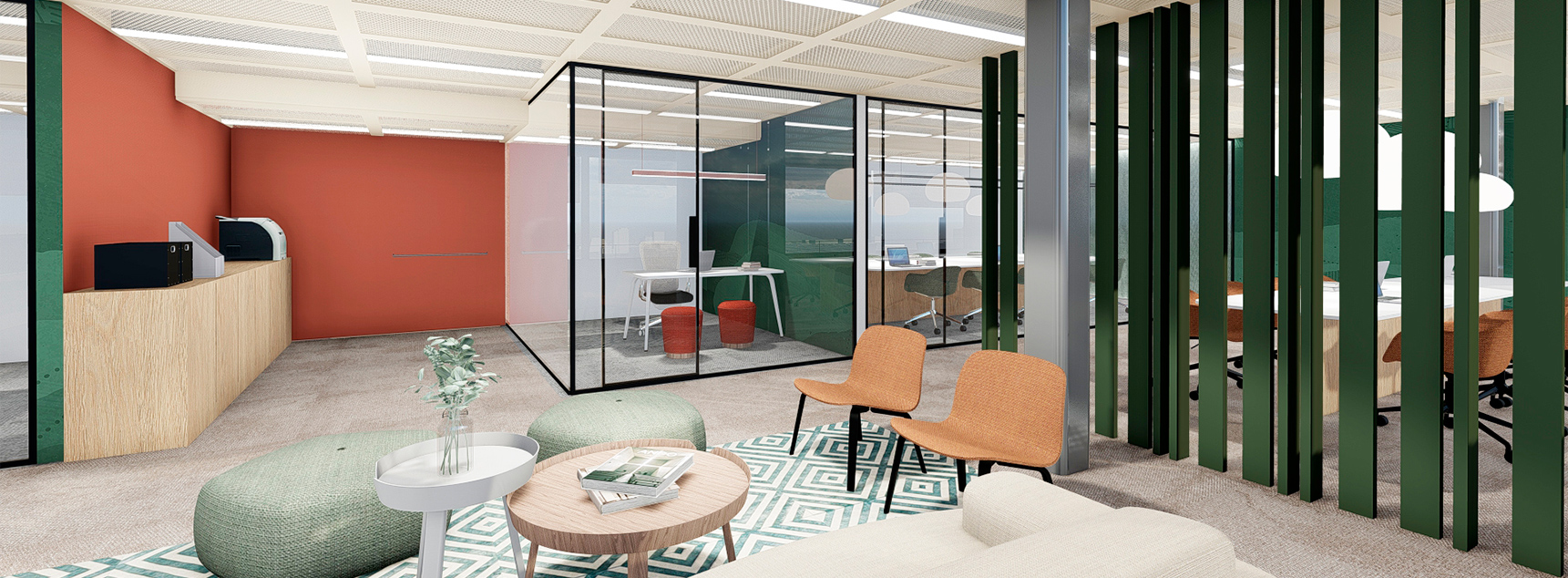Interview with Albert Triola, Country Leader Oracle Spain.
1. Please tell us how the need to update the workspace for Oracle emerged.
The project dates from prior to the COVID-19 crisis. The need arose to relocate the headquarters, which was on the outskirts of Madrid, to a more central location in order to be closer to customers and partners. Based on that, we identified a project to update the workspace to make it more collaborative, that is, not only as a physical space for employees but also as an environment and meeting place for all our stakeholders as well.
We made a purposeful decision to focus on flexibility by implementing 40% of workstations and leaving most of the available space occupied by areas that encourage gathering, collaboration, learning, outstanding customer service, and added value. In this sense, the project was planned as an opportunity to achieve two objectives: looking inward, the headquarters was planned to be an exciting place for employees, while looking outward, it was to be perceived as a flexible, attractive space for our entire network of customers and partners.
2. What things have changed compared to before COVID-19 in terms of the offices?
To us, the pandemic and the reflection on workspaces that came in its wake have been like a kind of double-check or confirmation of the model we had chosen for our headquarters. The COVID-19 crisis has confirmed that the model we had been focusing on, with goalbased management and work, hybrid and focused on flexibility, was the right one.
In a project like ours, what COVID-19 has done is simply reinforce it.
In terms of leadership, for years we have been working to define smart goals that cascade down and adapt to each organizational level with the assistance of the right processes and technologies. They are reviewed every quarter and half-year to create a flexible team management model that is very open to working from anywhere. In this sense, the pandemic has accelerated and consolidated this work culture and has signaled a shift—yet without disruption—which has made working and achieving goals even more important, not going to the office for its own sake.
In fact, personally, I don’t like the word office, because we should actually be looking at the importance of being in person at work from the standpoint of a club, the Oracle club, which encompasses employees, managers, and all our customers and partners. Informal or structured conversations, chance meetings in hallways or when having coffee are all valuable. We have to stop thinking about going to the office as an obligation, and focus more on the concept of being present with and for each other.
To me the underlying debate is not “office vs. no office” but rather how to create efficient companies where what matters isn’t the office or the timetable or the start or end of the workday but being efficient in line with the goals.
It is also true that technologies and tools were already available at Oracle; that is, they were already in place for the flexibility that COVID-19 brought about, around which we had rethought our offices and workspaces. So that helped confirm we were already heading in the right direction.
You have to create a solid culture of commitment and trust, which doesn’t mean being connected 24/7.
3. How do you create a culture that fosters this hybrid model?
I think that leaders are the ones who can generate this culture. When the leader of the organization defines and communicates its overarching goals, they are guiding and defining priorities. All of this shapes the culture. Managers have to understand how to manage their teams by goals and using this vision. You have to trust managers, avoid micromanagement, stay away from regular reviews, foster a culture of commitment and trust, and not ride your teams or allow them to be connected 24/7.
The word office evokes an archaic, somewhat inflexible, hierarchical concept. Companies are facing a different challenge, so our corporate spaces should help generate work models and cultures based on trust and flexibility associated with the efficacy that tools and technology provide nowadays. If we talk about more junior employees in our company, it is possible to implement this culture of commitment and flexibility with transparency and approachability through good leadership in middle management, by evaluating and designing what needs improvement.
We are convinced that this culture brings value, helps us to be much more competitive, and better fits the environment in which we live, where technology and the online world meet the physical environment.
4. In your project to transform the spaces, and in this entire phase we are going through, have you learned anything that surprised you that you’d like to share with our readers?
Yes, we’ve learned a very important lesson: you have to lead by example, and you have to get employees involved so that they are part of and actors in this change. You also have to manage the transition in the change.
